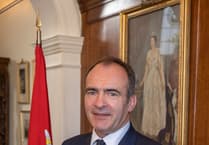The political bosses of the Post Office have launched a remarkable attack on the government and other politicians for not giving them enough support.
While using the surprise tactic of criticising those who they will need to convince to support any restructuring proposals, vice-chairman Tanya August-Hanson was rebuked by President of Tynwald Steve Rodan for lecturing others to stop asking questions in parliament.
And chairman Julie Edge (Onchan) was asked to retract a claim that Department for Enterprise members were advocating a three-day week at the Post Office.
Their approach seemed to merely further antagonise Tynwald members who have frequently raised concerns about how the troubled Post Office is run, with accusations that bosses were looking at ways of ’screwing more money’ out of taxpayers.
All this came about after DfE member Lawrie Hooper (LibVan, Ramsey) raised questions about the options being presented to focus groups as part of a consultation on the future of the Post Office and why some issues not raised as part of the earlier public consultation were suddenly on the table.
The question was tabled for Ms August-Hanson, as Ms Edge had not been expected to be able to attend Tuesday’s sitting, although in the event she was there.
The Post Office is due to come back in October to present a retail strategy in the light of losses.
Mrs August-Hanson said the Post Office developed a ’discussion guide’ to give structure to the five focus groups, with four ’concepts, not options’ for discussion.
The four concepts were: Keep the post office network as it is; consolidate the network - meaning a reducing number of post offices to make the remaining ones more viable; introduce outreach offices, providing services on specific days or times in another location such as a community; or increase the provision self-service kiosks in convenient locations.
But Mr Hooper countered: ’The four discussion points that were just listed are subtly different to those that have been reported by people who have attended the focus groups.
’One of the discussion points that was reported was suggested to be a £47 increase in rates per person per year.’
He asked for clarity.
Ms August-Hanson hit back: ’As I was not there I have absolutely no idea as to what certain individuals may have queried of the Post Office or what they have not.’
However, she then gave an explanation as to where that figure would have come from.
She said: ’The Isle of Man currently provides the highest density of post office in the British Isles and declining transaction volumes have an impact on the viability of each office, not only for the Isle of Man Post Office but also for each of the independent sub-postmasters.
’So if the network was kept at the current size, a government or local/national subsidy would be required.
’As an example in 2018-19, the Isle of Man Post Office network made a loss of £1.5 million. If the network was subsidised, this would translate to an average impact of £47 per taxpaying resident, to answer that question.’
Mr Hooper branded the options presented as uninspiring.
He said they ’revolve around reducing the level of service on offer or simply finding alternative ways of screwing more money out of the Manx taxpayer’.
He added that the ’blanket-level’ of tax subsidy was not mentioned in the public consultation document, only mention of making up financial losses on the retail network from ’other commercial services’.
She conceded it was an idea that ’came about in a workshop that included the Post Office board and also the executive’.
Ms August-Hanson said they had to explore ’all avenues’. But she lost patience with the criticism.
She said that if he had any ideas ’perhaps he might consider coming in and speaking to the board or the executive before putting questions forward either in this place or in another place’.
To the chimes of ’hear, hear’ from several Tynwald members, President Steve Rodan intervened: ’Can I just make it perfectly plain that it is the absolute right of members of Tynwald to put questions in this place, quite irrespective of whether they may or may not be going into the department ahead of time. That is their right. That is what they are here for.’
decline
Tim Baker (Ayre and Michael) asked for assurances that the post office network had a more positive future, ’because the distinct impression that she has given by her answer is that there is one path for the Post Office and it is a path of managed decline and eventual closure’.
Ms August-Hanson insisted: ’The Post Office is absolutely determined to try to get itself out of the situation that it is in and it has to look to various other options that sit outside its current path in order to do that.’
She acknowledged ’ill-feeling’ but called for a ’level of positivity’ and support for the Post Office.
’It needs all government departments and all ministers to come together and give it a future. It needs members to give it a future. It needs businesses to help give it a future by communicating with it,’ she said.
’What I have seen thus far as a board member is that there are certain departments throughout government that do not necessarily give it the level of support that perhaps it could have.’
Ms August -Hanson resigned as political member of the Department of Home Affairs at the weekend, saying she wanted more freedom to scrutinise the work of government without being bound by collective responsibilty. She retains her Post Office role.



